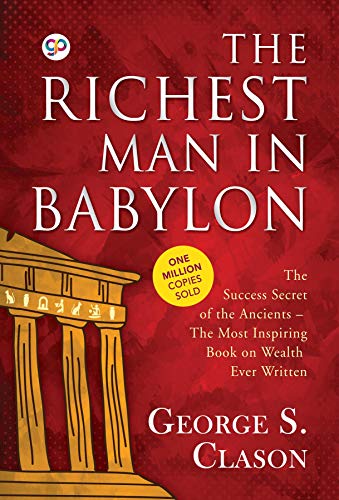
The Richest Man in Babylon: 7 Rules For Financial Success
Below is another book review installment from Rachel Stephens. Rachel is a 20-something financial analyst.
In the 1926 classic, The Richest Man in Babylon, author George Clason shares a timeless set of principles for “those who are ambitious for financial success.”
Billed as “the Bible of financial freedom,” Clason’s book unfolds its lessons through a series of short stories set over 4,000 years earlier in ancient Babylon. The lessons themselves are straightforward and show that the secrets to wealth building have remained unchanged and applicable across history.
The common theme of the tales is that a person can work hard, learn from their mistakes, and become wealthy. While none of the concepts are likely to be earth-shattering for most readers, they encapsulate the fundamentals that are the basis of money management.

And join over 800,000 readers getting our Insiders newsletter, where we share exclusive content that’s not on the blog:
Despite titular connotations, The Richest Man In Babylon is not religious. But the effect of framing the book as a religious tome is that the advice given comes across as wise and infallible. Whether that’s true is debatable—though, that said, there is a strong basic framework here and several sound principles.
The primary lesson comes from Arkad, the proclaimed richest man in Babylon. At the bequest of the King, Arkad shares his “seven cures to a lean purse” so that both individuals and society as a whole can reap the benefits of fiscal growth.
1. Start Thy Purse to Fattening
This point is actually the crux of the book: the classic principle of paying yourself first. Clason recommends saving at least 10% of all income earned.
Even in his example of those who are paying off debt, he still advocates setting aside this one-tenth. If you want to save money for your future, you must begin by consistently setting aside part of your earnings today.
2. Control Thy Expenditures
Essentially, this lesson is about learning to live within your means and avoiding lifestyle inflation. Clason deems lifestyle inflation to be an ‘unusual truth’ of humanity and states, “What each of us calls our ‘necessary expenses’ will always grow to equal our incomes unless we protest to the contrary.”
Of course, at IWT, lifestyle inflation isn’t always seen as a bad thing, as long as you’re on top of your numbers. If not, you could end up like this couple in episode 78 of the IWT podcast, who ignored their spending even though they knew they were about two months away from going bankrupt.
3. Make Thy Gold Multiply
This lesson is simple: Your wealth should extend beyond your income. Put your money to work by making smart investments and taking advantage of time and compounding interest.
4. Guard Thy Treasures From Loss
Here, the book encourages the protection of principle from loss. It is easy to criticize this idea, as most of us feel that investment vehicles that have the potential to lose value, such as stocks, are an essential part of a balanced portfolio.
If you take a bigger picture view, however, the lesson becomes more palatable. The penalty of risk is the potential of loss. Know your risk aversion and understand the risks in your portfolio.
5. Make of Thy Dwelling a Profitable Investment
This is yet another debatable principle. Clason argues that it makes more sense to make payments that will eventually become equity rather than giving money to a landlord. I’ll defer to Ramit’s strategy on buying vs. renting and say “Run the damn numbers” to see which method makes sense for you at this particular point in your life.
6. Insure a Future Income
This lesson boils down to retirement planning and insurance. Since insurance didn’t exist in ancient Babylon, Clason really doesn’t dive into this point much at all.
(However, if you are looking for a bit more information on how to retire well, you should read this recent Moneywise interview with Ramit highlighting why you should put as much money as possible into this one investment fund.)
7. Increase Thy Ability to Earn
Position yourself to make more money by improving your skills and making yourself more employable. Train yourself, go to classes, take jobs on the side; whatever you choose, set specific and measurable performance goals, and start working to earn more money now.
The Five Laws of Gold
The book’s other main lesson is the “five laws of gold” that Arkad teaches his son. The first three laws list ways to build wealth and are fairly repetitious with the above principles. Namely, the laws mandate paying yourself first, investing your money well, and making informed investment decisions.
The remaining two laws describe ways in which money and wealth will be lost. Specifically, it mentions avoiding investments we’re not familiar with, trying to seek ‘usurious’ returns, or trusting our ‘romantic desires in investment.’ Overly-complicated portfolios are likely to fail. Given all the Ponzi schemes that are surfacing these days, these lessons especially hit home right now. It is not the sexy investment strategies that win, for these are the investments that are often least understood and most risky.
The remainder of the book is peppered with lessons and insight, such as:
- Choose wisdom over money
- Borrow sensibly, as the unintelligent use of debt will undoubtedly become a later burden
- Seek luck by working hard and accepting opportunities, not by waiting for one-off successes.
And my personal favorite:
- “Where the determination is, the way can be found.”
In other words, commit, follow through, and enjoy your successes
Why You Should Read The Richest Man In Babylon?
Although the book can often feel simplistic and repetitive, the advice about earning and savings is sound. By its nature, a book that is set in the days well before banks and organized markets is going to be sparse on details. This is not the book to read if you are looking for a how-to guide or specific techniques. Rather, this is a book that takes a theoretical approach to examining personal monetary policy.


At less than 100 pages, The Richest Man In Babylon is a quick read and is an excellent choice for those who respond to qualitative motivation and storytelling.
It would also be a particularly pertinent book for those who may feel overwhelmed by all the recent market turmoil. If this book accomplishes anything, it demonstrates that the fundamental truths to wealth building are still applicable today.
…but you don’t have to take the same path as everyone else. How would it look if you designed a Rich Life on your own terms? Take our quiz and find out:



